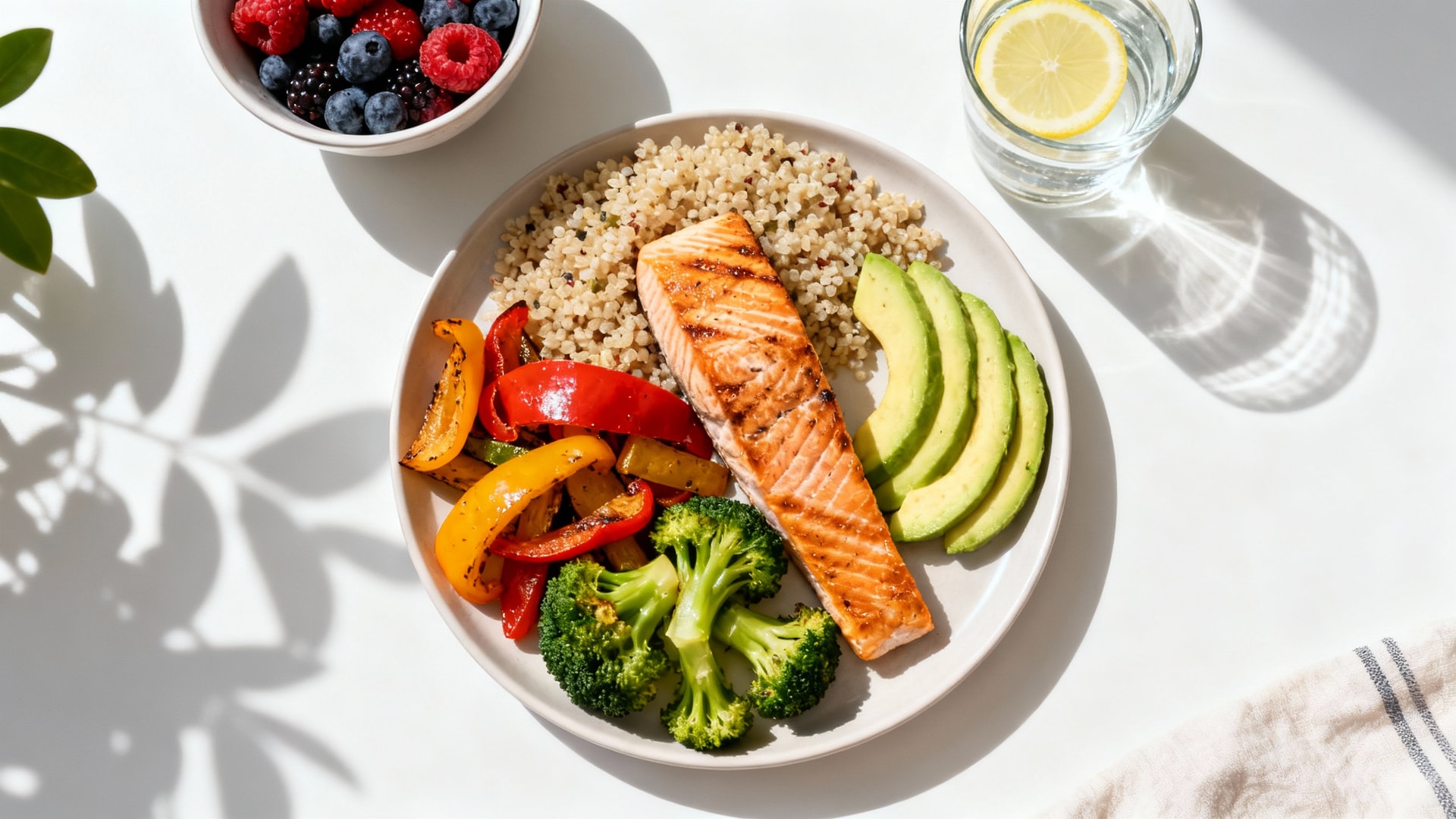Published 31 January 2024
Bouncing Back Strong: Enhancing Recovery with Proper Nutrition for New Mothers

The Importance of Proper Nutrition for New Mothers
Proper nutrition plays a vital role in supporting the health and well-being of new mothers. Understanding the nutritional needs during this postpartum period is essential for a smooth recovery and to meet the demands of motherhood. Let’s explore the importance of proper nutrition for new mothers and the benefits it offers for postpartum recovery.
Understanding the Nutritional Needs of New Mothers
After giving birth, a woman’s body goes through significant changes. Proper nutrition is crucial during this time to support the body’s healing process, replenish nutrient stores, and provide the energy needed to care for a newborn. Some essential nutrients that new mothers should focus on include:
-
Protein: Protein-rich foods aid in tissue repair and recovery after childbirth. It is recommended to include lean meats, fish, poultry, legumes, and dairy products in the diet to meet protein needs.
-
Essential Vitamins and Minerals: Vitamins and minerals are vital for energy production, immune function, and overall well-being. Including a variety of fruits, vegetables, whole grains, and dairy products can help meet the recommended intake of vitamins and minerals.
-
Healthy Fats: Healthy fats are necessary for hormonal balance, brain health, and the absorption of fat-soluble vitamins. Sources of healthy fats include avocados, nuts, seeds, olive oil, and fatty fish.
Understanding the specific nutritional needs of new mothers is crucial for maintaining optimal health and promoting a successful recovery.
Benefits of Proper Nutrition for Postpartum Recovery
Proper nutrition offers numerous benefits for postpartum recovery, both physical and emotional. Here are some key benefits:
-
Enhanced Healing: Adequate nutrition supports the body’s healing process after childbirth. Nutrients like protein, vitamins, and minerals are essential for tissue repair and the formation of new cells.
-
Increased Energy: The demands of caring for a newborn can be physically and mentally exhausting. A well-balanced diet provides the energy needed to meet these demands and helps prevent the feeling of fatigue.
-
Improved Mood and Mental Well-being: The postpartum period can bring hormonal fluctuations and emotional challenges. Proper nutrition helps in maintaining stable blood sugar levels, which can positively impact mood and overall mental well-being.
-
Enhanced Immune Function: A strong immune system is crucial during the postpartum period. Nutrients like vitamin C, vitamin D, and zinc support immune function and help new mothers stay healthy.
-
Support for Breastfeeding: If a mother is breastfeeding, proper nutrition is vital for the production of breast milk and the transfer of essential nutrients to the baby. A balanced diet helps ensure an adequate supply of milk for the growing infant.
By prioritizing proper nutrition during the postpartum period, new mothers can support their recovery, enhance their well-being, and provide optimal care for their newborns.
In the next section, we will delve into the key nutrients that new mothers should focus on to support their postpartum recovery.
Key Nutrients for New Mothers
Proper nutrition plays a vital role in supporting the health and well-being of new mothers. It is essential to focus on consuming key nutrients that aid in healing, recovery, energy levels, and overall immunity. Here are three important nutrients that new mothers should prioritize in their diet:
Protein-Rich Foods for Healing and Recovery
Protein is a crucial nutrient for new mothers as it supports tissue repair and helps in the recovery process after childbirth. Including protein-rich foods in your diet can aid in rebuilding muscles and tissues, promoting healing, and restoring strength.
| Protein-Rich Foods |
|---|
| Lean meats (chicken, turkey) |
| Fish (salmon, tuna) |
| Eggs |
| Dairy products (milk, yogurt, cheese) |
| Legumes (beans, lentils, chickpeas) |
| Nuts and seeds (almonds, walnuts, chia seeds) |
| Tofu and tempeh |
Adding these protein sources to your meals and snacks can provide the necessary amino acids for repair and recovery. It’s important to consult with a healthcare professional or a registered dietitian to determine the appropriate protein intake based on your individual needs.
Essential Vitamins and Minerals for Energy and Immunity
New mothers need an ample supply of essential vitamins and minerals to support their energy levels and boost their immune system. Incorporating a variety of nutrient-dense foods into their diet can help meet these needs.
| Essential Vitamins and Minerals |
|---|
| Vitamin C (citrus fruits, berries, bell peppers) |
| Vitamin D (fatty fish, fortified dairy products) |
| Calcium (dairy products, leafy greens, fortified foods) |
| Iron (lean meats, beans, lentils, leafy greens) |
| Zinc (shellfish, poultry, whole grains) |
| B vitamins (whole grains, legumes, nuts) |
These nutrients play a vital role in maintaining energy levels, supporting immune function, and aiding in the production of breast milk. It is important to ensure a well-rounded diet that includes a variety of fruits, vegetables, whole grains, lean proteins, and dairy products to obtain these necessary vitamins and minerals.
Healthy Fats for Hormonal Balance and Brain Health
Including healthy fats in the diet is essential for new mothers as they provide energy, support hormonal balance, and contribute to brain health. Omega-3 fatty acids, in particular, have been shown to have numerous benefits for both the mother and her baby.
| Healthy Fat Sources |
|---|
| Fatty fish (salmon, sardines) |
| Avocado |
| Nuts and seeds (walnuts, flaxseeds, chia seeds) |
| Olive oil |
| Coconut oil |
| Nut butter |
These fats help in regulating hormone production, reducing inflammation, and supporting brain function. Including these healthy fats in your diet can also contribute to the quality of breast milk. However, it is important to consume them in moderation as they are calorie-dense.
By prioritizing protein-rich foods, essential vitamins and minerals, and healthy fats, new mothers can provide their bodies with the necessary nutrients for healing, recovery, energy, and immunity. It’s important to consult with a healthcare professional or a registered dietitian to create a personalized nutrition plan that meets your specific needs during the postpartum period.
Meal Planning and Nutritious Food Choices
Proper nutrition plays a vital role in the postpartum recovery of new mothers. Meal planning and making nutritious food choices are essential for replenishing the body with essential nutrients and supporting overall well-being. In this section, we will explore the importance of building a balanced plate, incorporating whole foods and superfoods, and the significance of hydration and water intake.
Building a Balanced Plate
Building a balanced plate is crucial for ensuring that new mothers receive a wide range of nutrients necessary for their recovery. A balanced plate should consist of:
- Protein: Include lean sources of protein such as poultry, fish, eggs, legumes, and tofu. Protein aids in tissue repair and supports muscle recovery, which is particularly important during the postpartum period.
- Complex Carbohydrates: Incorporate whole grains like brown rice, quinoa, and whole wheat bread. These provide sustained energy and are rich in dietary fiber, aiding in digestion and preventing constipation.
- Healthy Fats: Include sources of healthy fats such as avocados, nuts, seeds, and olive oil. Healthy fats are essential for hormone production, brain health, and absorption of fat-soluble vitamins.
- Colorful Fruits and Vegetables: Opt for a variety of colorful fruits and vegetables as they are rich in vitamins, minerals, and antioxidants. These nutrients boost the immune system and aid in healing.
- Dairy or Dairy Alternatives: Choose low-fat dairy or dairy alternatives fortified with calcium and vitamin D to support bone health.
By incorporating these food groups into each meal, new mothers can ensure they are consuming a balanced and nutrient-dense diet.
Incorporating Whole Foods and Superfoods
In addition to building a balanced plate, incorporating whole foods and superfoods can provide additional nutritional benefits for new mothers. Whole foods are minimally processed and retain their natural nutrients, while superfoods are packed with a high concentration of vitamins, minerals, and antioxidants.
Examples of whole foods and superfoods that can be included in a postpartum diet are:
- Leafy Green Vegetables: Spinach, kale, and broccoli are rich in iron, calcium, and folate, which are important for energy levels and postpartum recovery.
- Berries: Blueberries, strawberries, and raspberries are antioxidant powerhouses, providing a range of vitamins and minerals.
- Salmon: A great source of omega-3 fatty acids, which are beneficial for brain health and reducing inflammation.
- Greek Yogurt: High in protein and calcium, Greek yogurt supports bone health and aids in digestion.
- Chia Seeds: These tiny seeds are packed with omega-3 fatty acids, fiber, and antioxidants, making them a nutritious addition to postpartum meals.
Incorporating whole foods and superfoods into the diet can enhance nutrient intake and support the overall well-being of new mothers.
Hydration and Importance of Water Intake
Staying hydrated is essential for new mothers as it helps maintain optimal bodily functions and supports the production of breast milk. Adequate water intake aids in digestion, prevents constipation, and promotes overall well-being.
It is recommended for new mothers to drink at least eight to ten cups (64 to 80 ounces) of water per day. However, individual hydration needs may vary, especially for breastfeeding mothers who may require additional fluids.
To ensure proper hydration, new mothers can:
- Carry a water bottle with them throughout the day as a reminder to drink water regularly.
- Flavor water with slices of fruits, such as lemon or cucumber, to make it more appealing.
- Consume hydrating foods like watermelon, strawberries, and cucumbers, which have high water content.
Remember that thirst is not always an accurate indicator of hydration status, so it’s important to drink water consistently throughout the day.
By focusing on building a balanced plate, incorporating whole foods and superfoods, and maintaining proper hydration, new mothers can provide their bodies with the nourishment needed for a healthy postpartum recovery.
Addressing Common Nutritional Concerns
Proper nutrition is essential for new mothers as they recover from childbirth and navigate the challenges of motherhood. Addressing common nutritional concerns is crucial to support their overall well-being and ensure optimal postpartum recovery. Let’s explore some of the common concerns related to nutrition for new mothers.
Managing Postpartum Weight
Many new mothers are concerned about managing their postpartum weight. It’s important to approach weight management with a balanced and holistic perspective. While it’s natural for some weight to be retained after childbirth, focusing on a healthy and nutritious diet can help support gradual weight loss.
Aim to include a variety of nutrient-dense foods in your diet, such as fruits, vegetables, whole grains, lean proteins, and healthy fats. Avoid restrictive diets or drastic calorie-cutting, as they may negatively impact energy levels and milk supply if breastfeeding. Instead, focus on nourishing your body with wholesome foods and engaging in regular physical activity as recommended by your healthcare provider.
Breastfeeding and Nutrition
Breastfeeding mothers have unique nutritional needs to support both their own health and the production of breast milk. It’s important to consume a well-balanced diet that includes a variety of nutrient-rich foods.
Ensure an adequate intake of protein, which is essential for milk production and tissue repair. Incorporate lean meats, poultry, fish, legumes, nuts, and seeds into your meals. Additionally, consuming foods rich in calcium, iron, and omega-3 fatty acids can provide important nutrients for both you and your baby.
Stay hydrated by drinking plenty of water throughout the day, as breastfeeding can increase your fluid needs. Limit your intake of caffeine and alcohol, as they may pass into breast milk and affect your baby.
For more information on breastfeeding and nutrition, refer to our article on breastfeeding challenges and solutions.
Dietary Restrictions and Allergies
Some new mothers may have dietary restrictions or allergies that need to be addressed. If you have specific dietary needs or allergies, it’s important to find suitable alternatives to ensure you are meeting your nutritional requirements.
Consult with a healthcare professional or a registered dietitian to develop a personalized nutrition plan that accommodates your dietary restrictions or allergies. They can guide you in finding appropriate substitutes and ensuring you receive all the necessary nutrients.
If you suspect that your baby may have food allergies or sensitivities, consult with your pediatrician or an allergist for further evaluation and guidance.
By addressing these common nutritional concerns, new mothers can nurture their bodies and support their postpartum recovery journey. Remember, every individual is unique, so it’s important to seek professional guidance to ensure you are meeting your specific nutritional needs during this transformative phase.
Seeking Support and Professional Guidance
Navigating the postpartum period can be a challenging time for new mothers. To ensure optimal nutrition and overall well-being, it is beneficial to seek support and professional guidance. Here are a few avenues that new mothers can explore:
Consulting a Nutritionist or Dietitian
A nutritionist or dietitian can provide personalized guidance and support when it comes to postpartum nutrition. These professionals have the expertise to assess your individual nutritional needs and develop a tailored plan to meet those needs. They can help you create a well-rounded diet that supports postpartum recovery, breastfeeding, and overall health.
By working with a nutritionist or dietitian, you can address specific concerns or dietary restrictions you may have. They can also provide valuable insights into incorporating essential nutrients into your meals. To find a qualified professional, consider seeking recommendations from your healthcare provider or researching reputable organizations in your area.
Postpartum Care Services and Confinement Centers
Postpartum care services and confinement centers offer comprehensive support and care during the postpartum period. These facilities provide a nurturing environment where new mothers can focus on their recovery and well-being. Many confinement centers in Singapore offer personalized care, including nutritious meals that cater to the specific needs of new mothers.
These centers often have experienced staff members who can guide new mothers on proper nutrition and help them make nutritious food choices. They can provide valuable advice on meal planning, portion sizes, and incorporating suitable ingredients for postpartum recovery.
When considering a postpartum care service or confinement center, it’s essential to research and choose one that aligns with your preferences and values. Seek recommendations from other mothers or consult with your healthcare provider for reputable options.
Holistic Approaches to Nutrition and Wellness
In addition to professional guidance, new mothers may also explore holistic approaches to nutrition and wellness. This can include incorporating traditional practices, herbal remedies, or alternative therapies. Some new mothers find comfort and support through practices such as acupuncture, herbal teas, or meditation.
When exploring holistic approaches, it is crucial to consult with healthcare professionals or practitioners who specialize in postpartum care. They can provide guidance on safe and effective practices that complement your nutritional needs and overall well-being.
Remember, every new mother’s journey is unique, and what works for one may not work for another. It’s important to listen to your body, seek professional advice, and make informed decisions that support your specific needs and preferences.
By seeking support and professional guidance, new mothers can ensure they receive the necessary care and attention to promote their postpartum recovery and overall well-being. Whether consulting a nutritionist, considering postpartum care services, or exploring holistic approaches, these avenues can help new mothers navigate the postpartum period with confidence and support.


